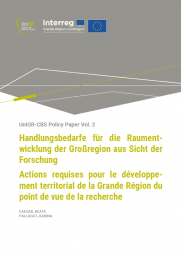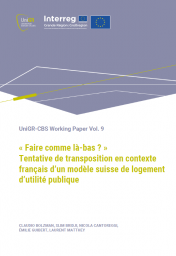Policy Paper Vol. 2

The policy paper 'Action Needs for Spatial Development in the Greater Region from a Research Perspective' summarises key findings of researchers from the UniGR-Center for Border Studies in five areas relevant to the Greater Region (demography and migration, transport, employment and economic development, energy land-scapes, cross-border governance) and formulates options for action for planning practice and political deci-sion-makers. In addition, it addresses the exchange of knowledge between research and politics.


